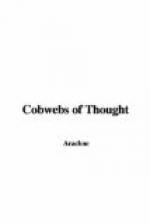on our own, much less on our moods. If we would
but take half the trouble to understand ourselves
that we take to study a science or art—if
we could learn to depend on the sequence of our own
thoughts as an engineer can on the sequence of movements
in his steam engine—if we could dig, and
penetrate into the depths of our own being, as a miner
penetrates into a seam of coal—we might
then cultivate with some profit our own special lines
of thought, our own gifts, that portion of individuality,
which we each possess. But it is so difficult
to get to know it—we are always on the surface
of ourselves. What power will unearth our self
and make us really know what we are and what we can
do? It is because we do not know ourselves, that
we fail so hopelessly to give the things which are
of incalculably real worth to the world, such as fresh
individuality, and reality of character. Among
millions of beings how few exist who possess strong
original minds! We are
not individual for
the most part, and we are
not real. Our
lives
are buried lives; we are unconscious
absorbers, and reproducers, under other words of that
which we have imbibed elsewhere. We need not only
fresh expressions of old statements, but actually
new ideas, and new conceptions. (The fresh
subjects
people talk about, are really fresh
conceptions
of subjects.) We shall never get this bloom of freshness,
and this sense of reality and individuality of view
unless we cultivate their soil—to have
fresh ideas, we must encourage the right atmosphere
in which alone they can live. We must not let
our own personality, however slight, be suppressed,
or be discouraged, or interfered with by a more powerful,
or a more excellent personality.
Individuality is so weak and pliable a thing in most
of us that it is very easily checked—it
requires watchfulness and care, and not to be overborne,
for the smallest individual thought of a mind of any
originality, is more worth to the world than any re-expression
of the thought of some other mind, however great.
Even the “best hundred books” may have
a disastrous effect upon us. They may kill some
aspirations, if they kindle others. Persons of
mature age may surely at some time have made the discovery
that much has been lost through the dominating influence
of a superior mind. Many persons, for instance,
have felt the great influence of Carlyle, and Ruskin,
in their youth. Carlyle could do incalculable
good to some minds by his ethics of work, but irremediable
harm to others; minds have actually become stunted
and sterile through that part of his teaching, which
was unsuited to them. Carlyle’s temperament
checked their proper development. Youth has a
beautiful capacity for trust and belief, and it accepts
everything as equal in goodness and truth from an
author it reverences. The young do not know enough
of themselves, and they do not trust enough to their
own instincts to discriminate. They are dominated




